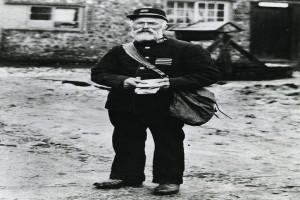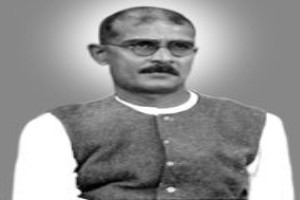
 By Mahadev Desai*
By Mahadev Desai*
(This article was published in Young India on November 26, 1931)
With the British Postmen
What can Gandhiji had to do with the British postmen?’ some one will ask. I will say at once that he has got to do with everyone on earth who is interested in India and who would listen to him, and though he has addressed audiences of all classes in England he has never felt like a stranger among them. But I must briefly say how he happened to address one evening a meeting of the Committee of the British Postal Union.
Within a few days of our arrival here a Postman hesitatingly approached Miraben for Gandhiji’s autograph in a book of a unique character. It was divided into sections with pages given to soldiers, statesmen, scholars, humanitarians and philanthropists and every autograph (with a photograph) was given its proper place in the book. It was a matter of some surprise that the autograph book belonged to an enterprising postman, not the one who had come for the autograph, but one who had dedicated his life to the service of the lepers in India. We were naturally interested and heard from Mr Gurr something about the activities of Mr. Cardinal, who, whilst he had gone soldiering in India, was inspired with a mission to serve the lepers in India. Having secured the autograph and established contact with us, Mr Gurr would drop in now and again, tell us something about the activities of the Postal Union in Great Britain and send us copies of the Union’s international organ, ‘The Post.’ It was he who was instrumental in bringing about this meeting at the Union’s headquarters.
Also read: History Recalled: “Ends and Means”
Their office, their meeting-hall, the way in which they conducted the proceedings of the meeting, their speeches, would not even for a moment ‘make you suspect that they were postmen. But they were genuine honest postmen, who did their job and found time to interest themselves not only in their nation’s affairs, but in those of oppressed nations like ours. There was no comparison between them and our ‘wretchedly paid, ignorant, exceedingly hard-worked postmen,” as Gandhiji described them. The reason was obvious. The former belonged to a free nation, the latter belonged to a subject nation, and to drive the contrast home,
Gandhiji told them that the proportion between an Indian postman’s salary and the Post Master General’s was the same as that between an average Indian’s income and the Viceroy’s. In the circumstances one could not dream of a full-fledged weekly like “The Post” being conducted by the postmen in India, or of a Union with a magnificent office, or of their subscribing money to carry on a leper asylum in India. “We had,” said Gandhiji, “a Postmen’s Union in India whose president was no less a man than the President of the Congress, but which, from the very nature of things, existed merely to ventilate grievances.”
Whilst sharp contrasts like these when your appetite for freedom and make you more and more determined not to rest till it is achieved, let me not in any way seem to detract from the great work the British postmen are doing, or from their courtesy in inviting Gandhiji to tell them something about Indian postmen, about Indian leper asylums, and about his mission in England. Mr. Cardinal, for whom Indian culture and Indian epics and Indian heroes and heroines, and even the Indian mountains and rivers, had an irresistible appeal, and who, as he said, though a soldier, lived in India with his eyes open, was moved at the sight of a leper in Allahabad and decided to devote himself to the service of the lepers in India. On his return to England, he became a postman, narrated to his friends his experiences, and it was out of the contributions of postmen all over Great Britain that he was able to open a Leper Asylum in Madura. Twice since then, the Postal Department had granted him leave of absence for three months and he has seen the Asylum develop into a fair-sized colony under his very eyes. He has now retired from postal service, but not from the service of the lepers in India, and he is still carrying on his humanitarian work through voluntary annual contributions from the postmen in England.
The Union’s interest in Indian postmen too is not negligible. The Chairman described the Union as an international one in outlook, though they had been prohibited from affiliating themselves with an International Union. But they were hoping that one day they may be part and parcel of a world-wide organisation. Their present membership is 100,000 and their journals (international and local) are distributed to every member.
It was to pay a compliment to their great organising skill and humanitarian work that Gandhiji readily agreed to pass an evening with them, and it is to enlist their sympathy for India that he introduced to them in vivid and graphic language the romance of the fight for freedom.
*Mahadev Desai was an eminent freedom fighter and Mahatma Gandhi’s personal secretary; article courtesy his grandson, Nachiketa Desai.






I am the great granddaughter of Francis Cardinal the British Postman in the article. I read it with great interest. Thank you for making it available.